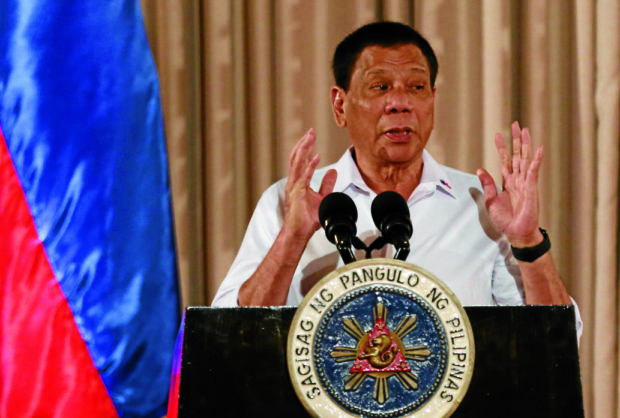
President Rodrigo Duterte.
INQUIRER PHOTO/JOAN BONDOC
President Rodrigo Duterte has asked Congress to extend his martial law proclamation and the suspension of the privilege of the writ of habeas corpus in Mindanao until Dec. 31, or for more than five months.
Presidential spokesperson Ernesto Abella said on Tuesday that Mr. Duterte had sent a seven-page letter to the Senate and the House of Representatives seeking an extension because the rebellion in Mindanao could not be quelled by July 22, the day his proclamation, limited to 60 days under the Constitution, expires.
“The primary objective of the possible extension is to allow our forces to continue with their operations unhampered by deadlines and focus more on the liberation of Marawi and its rehabilitation and rebuilding,” Abella said.
Mr. Duterte declared martial law on May 23 after Maute and Abu Sayyaf terrorists overran Marawi City.
Congress is to hold a special session on Saturday to consider Mr. Duterte’s request.
Quoting the President’s letter, Abella said Mr. Duterte made a “thorough personal assessment of the current situation in Marawi City and other parts of Mindanao” and took into account the recommendations of Defense Secretary Delfin Lorenzana, Armed Forces of the Philippines Chief of Staff Gen. Eduardo Año, and Philippine National Police Director General Ronald dela Rosa.
“I have come to the conclusion that the existing rebellion in Mindanao … will not be quelled by 22nd July 2017, the last day of the 60-day period provided under Section 18 Article 7 of the 1987 Constitution,” the President said.
“For this reason, and because public safety requires it, I call upon Congress to extend until 31st December 2017 or for such a period of time as Congress may determine the proclamation of martial law and the suspension of the privilege of the writ of habeas corpus in the whole of Mindanao.”
Abella said that while the military and the police had given their recommendations the President “made his own proposal.”
“Again and again, he has said that there’s a looming situation in Mindanao which needs to be totally and completely addressed,” he said.
“Whatever info he has is all related [to] ensuring public safety,” he said.
Abella said the President’s letter dealt with a threat that was “not just locally confined … it has to do with a network of forces that are all over Mindanao.”
“They’re addressing it Mindanao-wide. It’s a Mindanao-wide situation,” Abella said.
Speaker Pantaleon Alvarez, in a radio interview, dismissed suggestions that a martial law extension was limited to 60 days.
“If you read the provision in the Constitution, nothing is written that you need this or that, what is clear … is Congress may extend the declaration of martial law. So that’s open,” he said. “If no limit is provided … [then] it depends on Congress until when they want to extend martial law.”
Rebels restricted
Año said on Tuesday that there were still 800 Maute armed supporters scattered across Mindanao, including 24 foreign terrorists who slipped into the country through its southern back door before the crisis in Marawi.
“They’re spread out in different areas in Mindanao but we have enough forces to confront them. This is also what’s good with martial law. We restrict and limit [the movement] of these armed groups,” Año told reporters.
“If there was no martial law, they could have easily reinforced [Marawi]. We were able to impose curfews and checkpoints in selected areas. It restricted the movements of armed groups,” he added.
“One thing is for sure, because of the prevailing situation in Mindanao, particularly in Marawi, we recommended an extension,” Año said.
He, however, said that the military could recommend martial law’s “early termination” once the security situation in Mindanao “normalizes.”
Socioeconomic Planning Secretary Ernesto M. Pernia dismissed fears that a prolonged martial law would disrupt economic activity in Mindanao. “In fact, martial law is also an environment that will make people safe,” he told reporters in Cagayan de Oro City. —With reports from DJ Yap and Ben O. De Vera